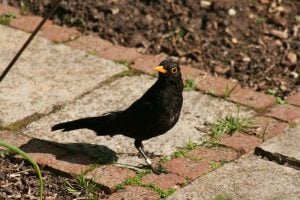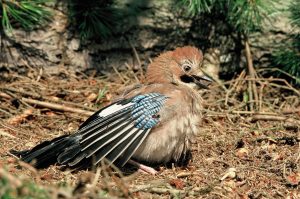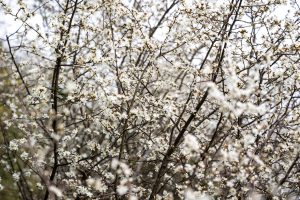Why you'll see less birds in your garden in August
A question we’re often asked once we’re well into August is why there seems to be fewer birds in the garden. Well there are two main reasons, though the first is the more significant…
This is the month that most birds, and certainly our garden birds, go through their annual moult. So basically birds are replacing their worn and tatty feathers with a whole new set, with the process normally taking around two weeks. And come this time of year a bird’s feathers really can become worn-out, having endured a hectic breeding season – e.g. squeezing in and out of nests to feed young.
Actually though, the birds may still be in your garden but now there’ll be hiding in undergrowth and doing everything they can to stay out of view of predators. And it’s essential they do this because their ability to fly well is seriously compromised during the time it takes for the flight feathers to regenerate.
[caption id="attachment_1907" align="alignnone" width="300"] Like all garden birds, Blackbirds are much less likely to be seen out in the open like this one during August[/caption]
Like all garden birds, Blackbirds are much less likely to be seen out in the open like this one during August[/caption]
Being less active means that the birds will typically need less food, but they will certainly need some. What can really help them is husk-free mixes, sunflower hearts, sultanas soaked in water, and suet pellets, as all these highly nutritious foods require no additional work on the part of bird to eat them (e.g. black sunflower seeds need the bird to crack them open, and species such as Blackbird and Robin can’t do that anyway). So they get the important food they need quickly and can then get back under cover.
The second reason is that once birds have finished breeding, some may disperse to find new territories. Of course this will inevitably even out, because any birds which leave you may well be replaced by others coming in. But in the short term there can be less birds, and especially ahead of the winter months when they may disperse into the countryside before returning to gardens to find food as the days become colder.
The birds are still there but hiding whilst they moult
This is the month that most birds, and certainly our garden birds, go through their annual moult. So basically birds are replacing their worn and tatty feathers with a whole new set, with the process normally taking around two weeks. And come this time of year a bird’s feathers really can become worn-out, having endured a hectic breeding season – e.g. squeezing in and out of nests to feed young.
Actually though, the birds may still be in your garden but now there’ll be hiding in undergrowth and doing everything they can to stay out of view of predators. And it’s essential they do this because their ability to fly well is seriously compromised during the time it takes for the flight feathers to regenerate.
[caption id="attachment_1907" align="alignnone" width="300"]
 Like all garden birds, Blackbirds are much less likely to be seen out in the open like this one during August[/caption]
Like all garden birds, Blackbirds are much less likely to be seen out in the open like this one during August[/caption]Help your garden birds get important food quickly when they're moulting
Being less active means that the birds will typically need less food, but they will certainly need some. What can really help them is husk-free mixes, sunflower hearts, sultanas soaked in water, and suet pellets, as all these highly nutritious foods require no additional work on the part of bird to eat them (e.g. black sunflower seeds need the bird to crack them open, and species such as Blackbird and Robin can’t do that anyway). So they get the important food they need quickly and can then get back under cover.
Some species may disperse to find new territories
The second reason is that once birds have finished breeding, some may disperse to find new territories. Of course this will inevitably even out, because any birds which leave you may well be replaced by others coming in. But in the short term there can be less birds, and especially ahead of the winter months when they may disperse into the countryside before returning to gardens to find food as the days become colder.


